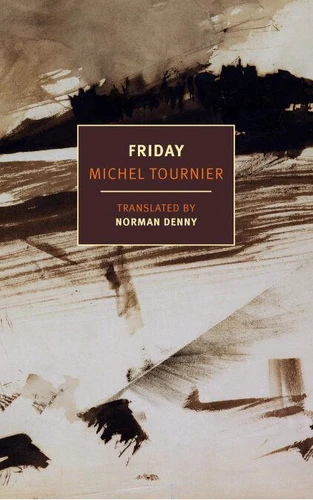A provocative retelling of Robinson Crusoe, this classic of twentieth-century French literature depicts the explorer's struggle to tame nature and the transformative power of his relationship with the indigenous character, Friday. One of the most commonly assigned books in French high schools, Friday mines the philosophical underpinnings of Defoe's original story, exploring concepts of imperialism, world-building, and existentialism.
Friday is the Friday of Robinson Crusoe, and Michel Tournier's retelling of Defoe's tale of solitude and survival turns it on its head. Cast away on a tropical island, the God-fearing Crusoe hasn't the least doubt what he must do: tame the wilderness and stamp it with the sign of civilization, a fool's errand to which he devotes years and in which he comes close to succeeding. Then Friday shows up, infuriating him with his "irrepressible, lyrical, and blasphemous" laugh, and a new, more challenging task confronts the island's self-proclaimed master.
But after an unforeseen event destroys all of Crusoe's work, it is up to Friday to teach him just how ignorant he is and always has been. Friday was Tournier's first novel, and it quickly found a wondering and delighted readership. Writing about the book in his autobiography, Tournier asks, "What was Friday to Daniel Defoe? Nothing: an animal, at best a creature waiting to receive his humanity from Robinson Crusoe, who as a European was in sole possession of all knowledge and wisdom." In Friday, Tournier steps out of the secular world of the Western novel into the sacred precincts of universal mythology.
The result is radiant, sensual, funny, and utterly unexpected-a modern masterpiece.
A provocative retelling of Robinson Crusoe, this classic of twentieth-century French literature depicts the explorer's struggle to tame nature and the transformative power of his relationship with the indigenous character, Friday. One of the most commonly assigned books in French high schools, Friday mines the philosophical underpinnings of Defoe's original story, exploring concepts of imperialism, world-building, and existentialism.
Friday is the Friday of Robinson Crusoe, and Michel Tournier's retelling of Defoe's tale of solitude and survival turns it on its head. Cast away on a tropical island, the God-fearing Crusoe hasn't the least doubt what he must do: tame the wilderness and stamp it with the sign of civilization, a fool's errand to which he devotes years and in which he comes close to succeeding. Then Friday shows up, infuriating him with his "irrepressible, lyrical, and blasphemous" laugh, and a new, more challenging task confronts the island's self-proclaimed master.
But after an unforeseen event destroys all of Crusoe's work, it is up to Friday to teach him just how ignorant he is and always has been. Friday was Tournier's first novel, and it quickly found a wondering and delighted readership. Writing about the book in his autobiography, Tournier asks, "What was Friday to Daniel Defoe? Nothing: an animal, at best a creature waiting to receive his humanity from Robinson Crusoe, who as a European was in sole possession of all knowledge and wisdom." In Friday, Tournier steps out of the secular world of the Western novel into the sacred precincts of universal mythology.
The result is radiant, sensual, funny, and utterly unexpected-a modern masterpiece.




















